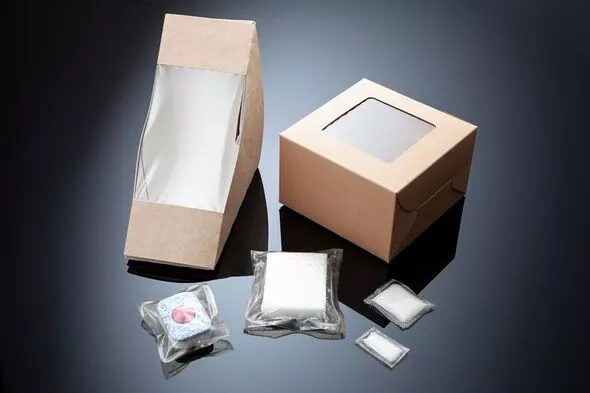
The Cambridge University spin-out’s ingenious solution is edible, compostable, vegan and gluten free.
Mimicking the spider’s web structure, the technology turns the protein in peas into a strong, flexible alternative to the current wrappings and ingredients used extensively in the food, household and personal care industries.
From the protein powder Xampla’s process creates a viscous fluid which when dried forms the material. A host of applications can be developed from the core technology. Production uses standard food processing equipment and the company is aiming for cost parity with plastic.
Now after 15 years development and £8.4million of venture capital backing, commercial rollout with partners from growing food brands to leading consumer multinationals has now begun in earnest as Xampla eyes a global market worth billions of pounds.
“This year more of our technology will be in the hands of consumers. Our mission is to be the next generation, seamless replacement to single use plastic,” says chief executive Simon Hombersley.
“Regulation to ban microplastics has come together with consumer demand for sustainable products to make this a very exciting moment for us.
“Our aim is to be a global leader, but we have to move fast and work with big hitters. There is a huge race now globally to be the company that dominates the plastics replacements market.”
A collaboration with meal kit retailer Gousto that launched the world’s first edible stock cube sachet has proved hugely popular with customers. “It sold out within an hour and we hope to develop the partnership,” adds Hombersley.
Another launch application is focusing on a natural replacement for the hidden microplastics in personal and homecare items such as laundry products and the fresheners used to keep everything smelling sweet.
“Most current fragrance microcapsules are made from synthetic polymers, these break down with friction releasing stored scents. But they are too small to be captured at the end of life,” explains Hombersley.
“They escape into our ecosystems and then our seas. Most users are unaware that every time they do the washing they are potentially releasing harmful microplastics into the environment causing untold damage and even ending up in the food chain.
The company is also embarking on another ground-breaking project, backed by £650,000 of funding from Innovate UK, that will tackle the widespread problem of microplastics pollution in agriculture.
In partnership with speciality chemicals maker Croda International and the National Institute for Agricultural Biology, the goal is to produce natural replacements for seed coatings.
These protect seeds from pests and diseases and increase germination, but at present are reliant on petroleum-based plastic wrapping that doesn’t degrade in the soil and leaves a lasting trail of pollution.
“Our trial paves the way for no residue as seeds grow and will improve soil health, a completely natural solution. A ban has been proposed on current coatings by the European Chemicals Agency in 2027 so our innovation will future proof it,” explains Hombersley.
Further eco transformations are also in the pipeline with Xampla planning to unveil a naturally soluble film for dishwasher tablets that could put an end to the stream of microplastics from this source that currently end up in our oceans.







